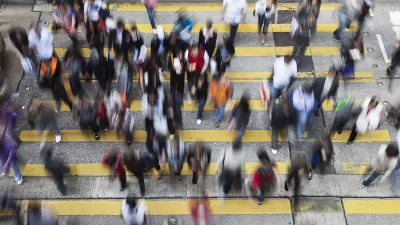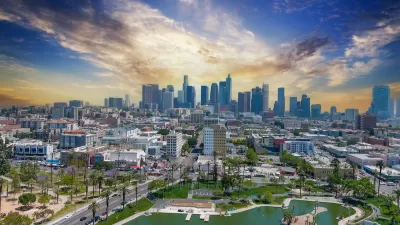In a strange confluence of factors, expired speed limits and a state statute have hampered speed enforcement. Unfortunately, the proposed solution also looks a like a problem.

Laura J. Nelson reports that an increase in speed limits on more than 100 miles of city streets might be coming to Los Angeles. The city is lagging in reaching its Vision Zero goals to eliminate traffic deaths in the city by 2025, and vehicle speed is a factor that can drastically affect a pedestrian’s chance of survival after a collision. But city officials say higher speed limits will ease existing enforcement restrictions, reports Nelson:
The dilemma stems from a decades-old California law designed to protect drivers from speed traps, which requires cities to post speed limits that reflect the natural speed of traffic. If a speed limit is too low, or if it is more than 7 years old, the police can’t use radar guns or other electronic devices to write speeding tickets there.
Speed limits had expired on over 200 miles of Los Angeles streets, as of this past summer, with minimal enforcement in these areas. Two-thirds of the street miles currently up for consideration are in the San Fernando Valley, where the speed limit has crept upward on many streets in the last decade, says Nelson. "Residents have approached the speed limit increases with trepidation, saying they are reluctant to see higher speed limits, but support more speed enforcement that targets the most dangerous drivers."
As for how Los Angeles found itself in this situation, Nelson notes that the Department of Transportation team conducting speed studies lost staff during the Great Recession and needed updates were not conducted. As a result, the number of speeding tickets issued by police plunged 77 percent from 2010 to 2017.
FULL STORY: L.A. considers raising speed limits on more than 100 miles of streets

Planetizen Federal Action Tracker
A weekly monitor of how Trump’s orders and actions are impacting planners and planning in America.

Map: Where Senate Republicans Want to Sell Your Public Lands
For public land advocates, the Senate Republicans’ proposal to sell millions of acres of public land in the West is “the biggest fight of their careers.”

Restaurant Patios Were a Pandemic Win — Why Were They so Hard to Keep?
Social distancing requirements and changes in travel patterns prompted cities to pilot new uses for street and sidewalk space. Then it got complicated.

Maui's Vacation Rental Debate Turns Ugly
Verbal attacks, misinformation campaigns and fistfights plague a high-stakes debate to convert thousands of vacation rentals into long-term housing.

San Francisco Suspends Traffic Calming Amidst Record Deaths
Citing “a challenging fiscal landscape,” the city will cease the program on the heels of 42 traffic deaths, including 24 pedestrians.

California Homeless Arrests, Citations Spike After Ruling
An investigation reveals that anti-homeless actions increased up to 500% after Grants Pass v. Johnson — even in cities claiming no policy change.
Urban Design for Planners 1: Software Tools
This six-course series explores essential urban design concepts using open source software and equips planners with the tools they need to participate fully in the urban design process.
Planning for Universal Design
Learn the tools for implementing Universal Design in planning regulations.
Heyer Gruel & Associates PA
JM Goldson LLC
Custer County Colorado
City of Camden Redevelopment Agency
City of Astoria
Transportation Research & Education Center (TREC) at Portland State University
Camden Redevelopment Agency
City of Claremont
Municipality of Princeton (NJ)





























